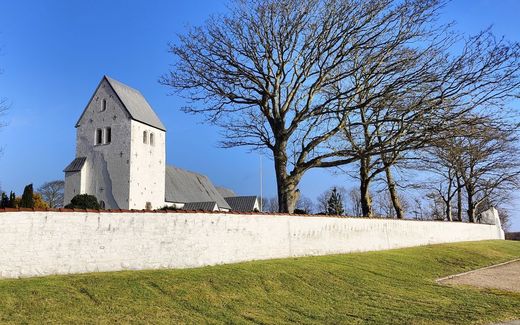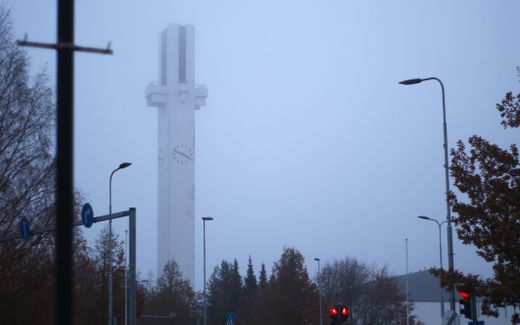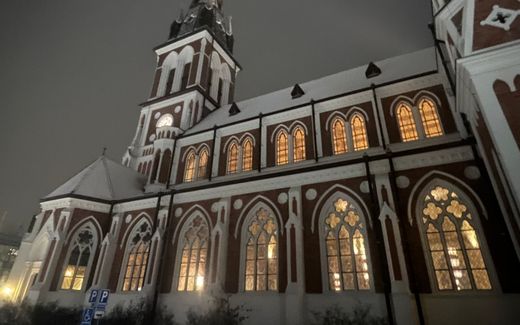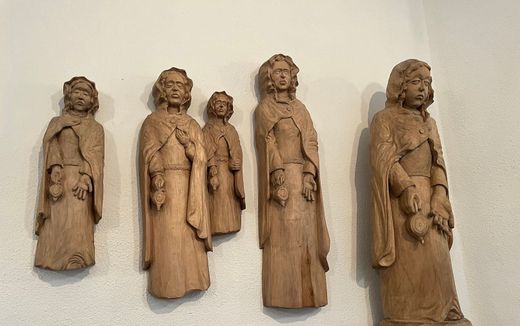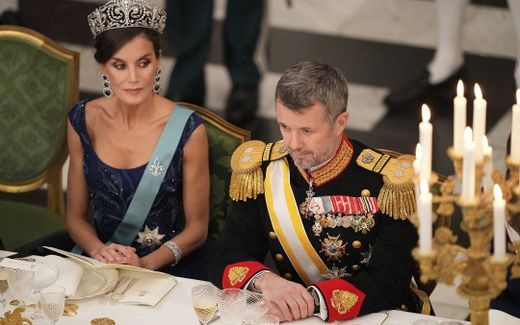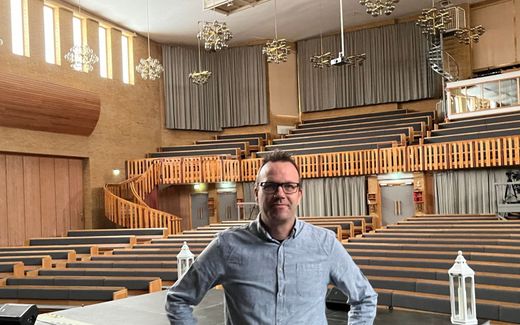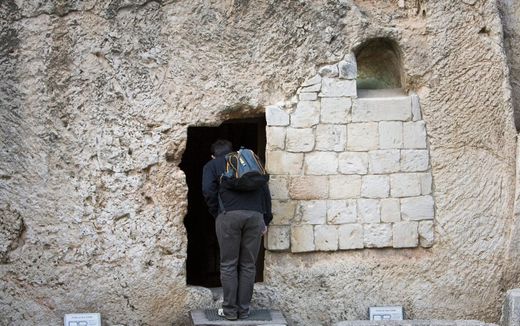Biblebelt feature: Danish Christians are united against liberal state church
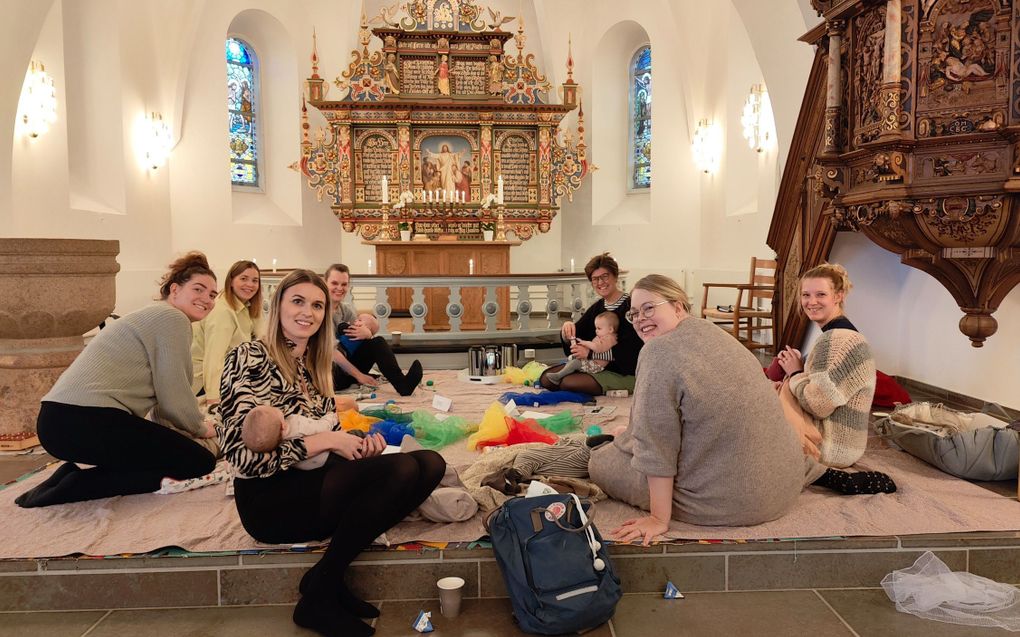
"By taking newborns to church and singing hymns there, they get used to the atmosphere at an early age." Photo CNE.news
Christian Life
In the Danish Bible Belt, Christians attend their own church service. But they are united in the Word of God. And in criticism of the Lutheran state Church.
It is quiet in the old church of Skjern. A faint sunshine enters the historic house of worship through the large windows. Soft singing breaks the silence. At the very front of the church, under the richly decorated pulpit, seven women sit on the platform near the altar. Each of them is holding a baby. The children are recently baptised newborns, Orla Villekjær explains. "By taking them to church, they get used to the atmosphere and the rhythms at an early age."
Part 4 of a series of European Biblebelts. Earlier editions were about Finland, Sweden and Germany
Villekjær is a pastor within the Lutheran Church of Denmark. Some 70 per cent of Danes are member of this people's church, or Folkekirken, though at most 2 per cent attend church weekly. Conservative Christians are in the minority, and their numbers are shrinking as this state church liberalises further. Allowing women into the ministry and blessing gay marriages only increased the outflow movement to free congregations.

Despite these developments, the 73-year-old Villekjær, a priest in the Folkekirken since 1981, has no intention of switching to a congregation independent of the state church. It is precisely this connection with the state that keeps him there. After all, it is the church which adds children to the birth register on behalf of the state. Moreover, many Danes, religious or not, still have their children baptised. "The Danish People's Church is still the best way to reach people with the Word of God," says Villekjær. "That is why I stay, even though I am very critical."
Landscape
The term Biblebelt is unfamiliar to most Danes. However, inquiries reveal that most conservative Christians reside in Western Jutland. The town of Skjern, with approximately 8,000 residents, is a stronghold for Denmark's only Christian political party: the Christian Democrats (KD). It's about a two-hour drive north from the German border towards the west coast. After an hour on the highway, the journey continues on smaller roads through the barren Jutland landscape.
"On the heathlands of Jutland, everything lies open and exposed to God," wrote the Danish philosopher Søren Kierkegaard in the nineteenth century. Over the years, the heathlands gave way to farmland, but for the rest, little changed. In the hilly, expansive plains of Western Denmark, the villages seem randomly scattered. Trees bend towards the east, bown by the prevailing western winds, which bring a rainy and unpredictable climate.

In February, the weather is no different. Stormy weather alternates between rain showers, dense fog banks, and periods of sunshine. "The [Jutland] heath must be particularly suitable for producing strong spirits," wrote Kierkegaard, whose parents come from the region. These strong spirits have developed the region into what Danes call "Production Denmark"; where Eastern Denmark holds knowledge, Western Denmark is characterised by innovation and production. Wind turbine giant Vestas originates from the region, and toy manufacturer Lego also has its roots in Western Jutland.
Additionally, the region is characterised by its conservatism. The population predominantly leans to the right, and it is in this area where various revival movements have their strongholds.
Straw
Like many other Danish Christians, 2012 brought the people of Skjern to a crossroads. On June 15 of that year, the first same-sex marriage within the Folkekirken was performed. For Jens Lomborg, this was the final straw. With his free congregation, he severed ties with the Danish People's Church. "The church agreed to something that has no basis in the Bible. It was a schismatic matter."
Lomborg, who had previously served as a missionary in Botswana, founded a "congregation of choice" in 2006 with around a hundred members. This congregation was part of the National Lutheran Church but has more freedom to tailor worship according to its preferences. "The Folkekirken has a fixed liturgy, which caused it to lose its connection with the people. I was then asked to lead the new church."

"2012" further alienated the choice congregation from the Folkekirken. It decided to sever all ties and become a free congregation. "Within a year, eighty people joined us. They renounced their membership in the Folkekirken because they wanted to belong to a Christian congregation."
In the eighteen years since Skjern Bykirke (pronounced: Buu-kirke) was founded, it has grown into a congregation with over five hundred members, the largest in Skjern. This growth prompted the congregation to relocate to an industrial estate; they now gather in a former butchery. Sterile-looking tiles serve as reminders of the building's previous purpose. "We have tried to preserve some things."
Machine
According to some priests in Skjern, the Danish People's Church is viewed as a liberal institution with outdated traditions. While priest Orla Villekjær remains loyal to the state church because of baptism, for pastor Mathias Richard Jefsen-Hansen, that sacrament is precisely why he is not to be a member. "I would regularly have to baptise children who never will set a foot in a church again. And the significance of such a baptism is negligible for those involved," says the 27-year-old minister. "I would find it difficult to be part of such a machine."

Jefsen-Hansen ministers in a congregation that is part of the Luthersk Mission (Lutheran Mission). This revival movement emerged mid-19th century in response to the liberalising Folkekirken. Participants of the movement gathered aside from church services for Bible studies and other meetings.
"Organising our own church services was long taboo, but that changed about twelve years ago," says Jefsen-Hansen. This development did not pose many issues with the Folkekirken. "I think that's because we attract different target groups. The People's Church is for people who appreciate tradition and structure, and we are more informal. We sometimes laugh during the service," the priest grins.
Organ music
While still being a member of the Folkekirken, Villekjær recognises and shares the objections of his fellow clergy. "I would like to add some more contemporary music to the liturgy," he states. The organ music was why his daughter with Down Syndrome switched to Skjern Bykirke, Lomborg's congregation. Villekjær had no issues with that. "She simply prefers more rhythmic music, and in terms of theology, we hardly differ." This sentiment is also confirmed by Lomborg and Jefsen-Hansen. "We are all Bible-believing Christians with an orthodox and conservative outlook on church life," Lomborg asserts.

For these conservative Christians, there is little political choice in Denmark, all the preachers claim. The only outspoken Christian party, KD, is in decline. The municipality of Ringkøbing-Skjern is their national stronghold. However, across Denmark, the party is not faring well. In the previous elections, they garnered around 20,000 votes, whereas in the elections before, they received 60,000.
Although local politicians decline to comment, the image emerges of a party searching for connection. In this quest, it is leaving its Christian values. For instance, in November, it abandoned its opposition to abortion, much to the dismay of Orla Villekjær. The priest is a vocal anti-abortion activist who rose to national prominence after participating in a pro-life demonstration in priestly attire in the 1990s. "In this way, I cannot vote for them nationally." Similar sentiments are echoed by various others. "At this moment, there is no Danish party you can vote for based on values," Villekjær asserts.
Flagpoles
Danes take pride in their flag. When strolling through Skjern —a town with mostly low-rise houses— one cannot escape the sight of numerous flagpoles. It's a tradition, explains Priest Lomborg. "We hoist the flag on birthdays."
The flag also plays a significant role at funerals. During a funeral procession in a nearby village, the priest, distinguished by his characteristic white collar, leads the way with the casket. He walks through the cemetery towards a waiting hearse. There, too, are the Danish flag flies at half mast. "As soon as the casket is lowered into the grave or placed in the car en route to the crematorium, the flag is raised to full mast," Lomborg explains. "This is to symbolise resurrection. That's why we also fly the flag on Good Friday."

Cremation is becoming increasingly common among Christians, notes Lomborg. "It's not as common here because people are more traditional-minded. But there are no ethical objections. God can gather ashes during the Last Judgment, too."
Meanwhile, contractors in Skjern are diligently working on new housing developments. These homes will predominantly be occupied by young families from the cities. The consequences of this trend also affect the churches. "It's challenging to engage them in church activities," Jefsen-Hansen observes. "Young families have little time for gatherings amidst their work and family lives."
Several contractors working on housing projects are Christian, Lomborg points out. He chuckles, "Initially, I wasn't aware of the Danish Biblebelt. But now that I think about it, quite a few Christians actually reside here."
Photo impression






Related Articles


